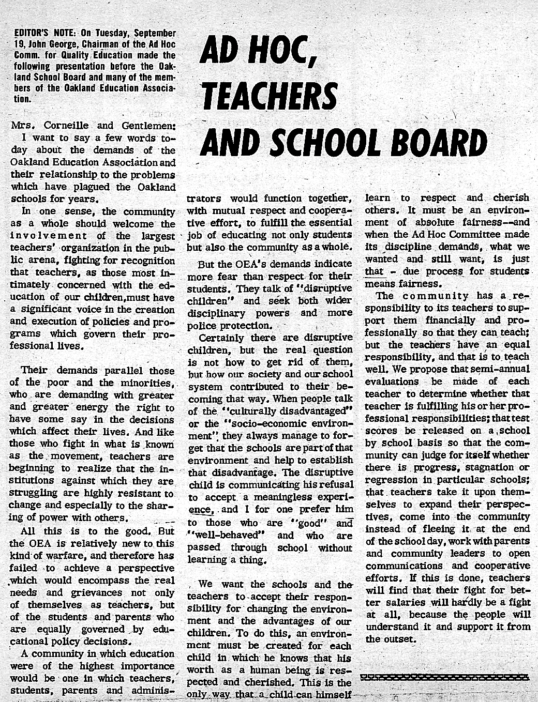The Flatlands noted in an issue published on the one-year anniversary of the Ad Hoc Committee (AHC) boycott that, of the Committee’s two goals (raising community awareness of educational inequality in Oakland, and effecting systemic educational reform), only the first had truly been achieved. No substantial increase in funding for flatlands schools had been secured, nor had any progress been made on curbing the racist, authoritarian disciplinary actions sanctioned by the district; moreover, tensions between teachers and students & community groups had never been higher.
This article prints a September 19, 1967 speech given by John George before the Oakland School Board. In recent weeks negotiations between OEA and the School Board had broken down over the issue of teacher safety. Teachers claimed that they lacked adequate disciplinary procedures for unruly students, with several expressing that they had on occasion feared for their lives in the classroom. The Board had attempted to mollify them with a 5% raise, but negotiations remained at an impasse over the issue of discipline.
George’s speech was directed primarily at the OEA members in the meeting’s audience. In it, he links the struggle of teachers in the workplace to the struggle of poor and marginalized peoples for dignity and justice. Since students, parents and teachers were “equally governed by educational policy decisions,” their collective efforts ought to be linked and mutually-reinforcing. George recognized that inadequate funding and stagnant wages drove much of the teachers’ dissatisfaction, noting that he too favored amelioration of these concerns.
On the issue of discipline, however, he saw the problem as one of basic human dignity: students (especially Black and Mexican-American ones) who were mistreated or misunderstood by their teachers were treated as disruptions and threats, subjected to arbitrary suspensions and expulsions, even corporal punishment. What these students required was not discipline but understanding, investment in individual talents rather than one-size-fits-all education. Dissatisfaction with the educational status quo in Oakland, he noted, had long gone unaddressed but not unarticulated, and misunderstandings between teachers and the community largely arose from distrust and unfamiliarity. In bridging these gaps and building social and cultural connections between the two groups, he hoped to find a collective solution to the city’s educational woes.
